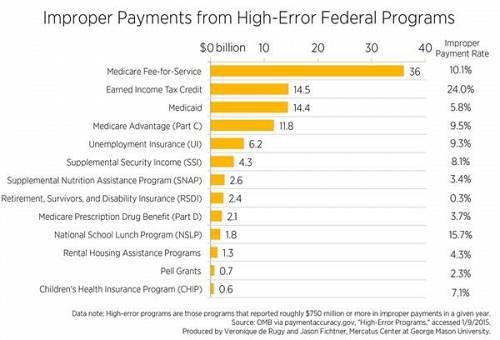Veronique de Rugy explores for Reason readers the federal government’s apparent disinterest in tracking down waste, fraud, and abuse within its programs.
[F]or all the incessant promises from policymakers to “eliminate waste, fraud and abuse” in government, the reality is that politicians—and the bureaucrats who administer Uncle Sam’s vast array of programs—are primarily concerned with shoving the money out the door. Indeed, a former Medicare administrator told the Journal, “Unless you change the rules of the game in terms of how Medicare pays, you’ll never fix it, [and Congress is] not going to voluntarily make major changes in a program that is as popular as Medicare.”
According to government estimates, federal programs made $106 billion in improper payments in fiscal year 2013 (the latest year for which data are available). The bulk of the improper payments came from health care programs. And that’s before the advent of Obamacare. Imagine what that number may look like in the few years.
Not all improper payments result from fraud. They also result from simple clerical errors or a failure to confirm that a recipient was eligible to receive the amount of money that was disbursed. Regardless of the reason, the numbers are evidence that the federal government is simply too big to be properly overseen.
Defenders of the status quo will point to the low improper payment rates for some programs to argue that, no really, we can minimize mistakes. However, a low rate could be a function of a program with liberal eligibility requirements providing “proper” benefits to people who should not be on the taxpayer dole in the first place. As I have written elsewhere, the Social Security disability program and food stamps might have relatively low improper-payment rates, but they’re also often distributing money to people under questionable—and, in some cases, objectionable—circumstances. Remember, for instance, the “adult baby” who was legally living off of federal disability payments?


